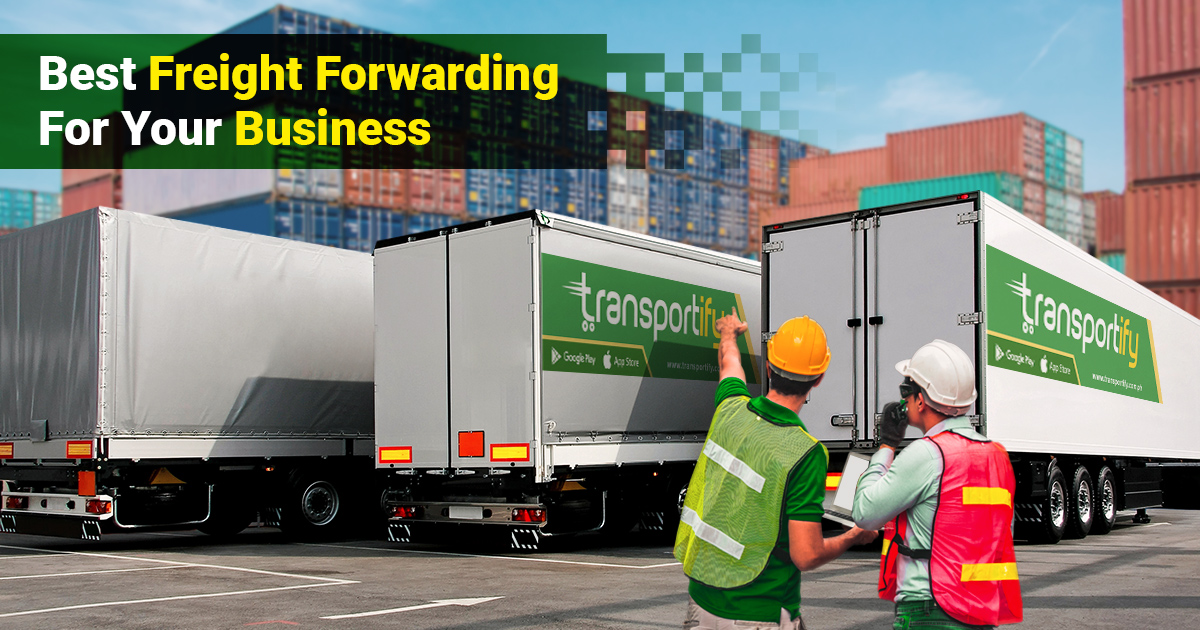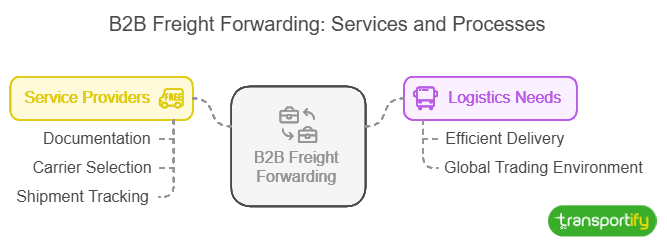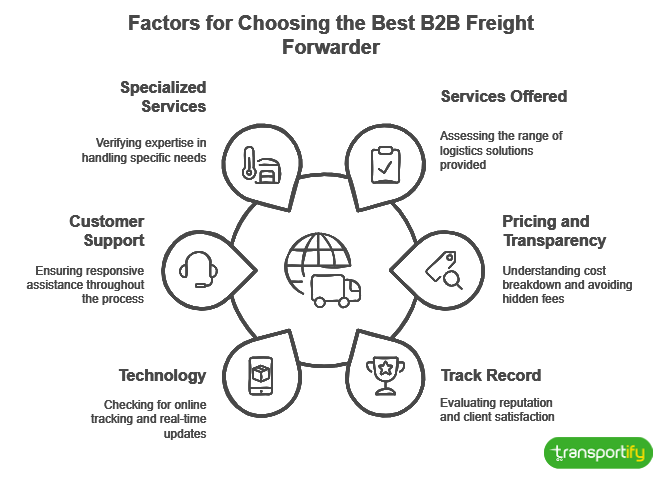
B2B freight forwarding helps businesses in managing challenges in logistics and transportation and in growing their connections. With the abundance of transportation service providers in the market that offer freight forwarding services, businesses should have an idea of how to choose a B2B freight forwarding service that will serve their needs.
Freight Forwarding in Businesses
Freight forwarding helps ensure efficient supply chain operations, timely delivery, and wider market access for businesses by acting as an intermediary between them and the receiver of the goods that they sell. This also helps businesses reach new markets and other businesses that are potential customers and even business partners and suppliers.
B2B Freight Forwarding

B2B freight forwarding refers to the streamlined service of managing and coordinating the transportations and logistics needs of businesses engaged in business-to-business (B2B) transactions. This involves the handling of the movement of goods and cargo from the point of origin to the final destination, ensuring efficient and timely delivery sent door-to-door.
B2B freight forwarding service providers act as intermediaries handling crucial tasks such as documentation, carrier selection, shipment tracking, and other tasks needed in freight forwarding, to support a smooth flow of goods between businesses in a global trading environment.
Why Use Freight Forwarding for B2B Transactions?
For businesses involved in commercial trade, B2B freight forwarding is a crucial part of supply chain management. To ensure effective and prompt delivery, B2B freight forwarding service providers focus on easing the transportation of products between businesses.
These businesses must have the know-how to manage customs paperwork and clearance, understand complex international shipping restrictions, and pick the best modes of delivery for B2B logistics services transactions, including B2B freight forwarding.
Businesses may improve their logistical processes with the help of value-added services that B2B freight forwarders provide, including distribution, inventory management, and warehousing. B2B freight forwarders offer businesses the assistance required to improve their supply chains, develop into new markets, and maintain a competitive advantage thanks to their worldwide networks, in-depth knowledge of their industries, and dedication to client satisfaction.
Good Company Relations
Timeliness is an important aspect of freight forwarding, especially B2B freight forwarding. It refers to the ability to deliver goods within the expected timeframe, meeting the agreed-upon delivery schedules and deadlines, which is strictly observed in B2B transactions as the client’s scheduling is also at stake. Following a well-planned schedule will help in avoiding delays to any B2B transaction.
Optimized B2B last mile delivery transactions is an efficient supply chain management which will not only affect one transaction but the relationship between the companies as well. It is common knowledge that a company must maintain good relations with its clients, suppliers and vendors. A good B2B freight forwarding service provider helps businesses meet customer and other client expectations, build trust, and maintain their reputation.
Market Expansion
Good B2B relations can also help a business expand its market and reach. The good relationships that a business builds with its clients and vendors can greatly help when a business needs to expand its market to new places. Clients and vendors can help the business have both supply and demand in the areas where the business will establish new markets for expansion.
B2B freight forwarding can help with transportation during the initial stages of expansion, as well as be utilized to create more relationships with other businesses, pinning the new opportunities for the businesses and other businesses in the new market is established.
SEE ALSO:
- Freight Transportation Services | What Are Its Different Types?
- What Is Freight Management System (FMS)?
- Freight Forwarding Company Packaging Tips (2023)
How To Choose The Best B2B Freight Forwarding?
With the growing competition in the market, and in logistics, businesses have so many options that they may consider in fulfilling their B2B freight forwarding needs. However, getting the best B2B freight forwarding service provider is crucial to deliver the best freight forwarding experience for both the business and its clients and vendors.

1. Services Being Offered
Assess the range of services provided by each freight forwarding service. Consider whether they offer end-to-end solutions, including freight management, customs clearance, documentation, insurance, warehousing, and distribution. Ensure their services align with your specific shipping requirements.
2. Pricing and Transparency
Obtain detailed pricing information from each freight forwarder and ensure an understanding of the breakdown of costs. Compare the quotes received, but remember that the cheapest option may not always be reliable. Look for transparency in pricing and ensure there are no hidden fees or charges.
3. Track Record and References
Research the freight forwarder’s reputation and track record in the industry. Seek references from their existing clients to get insights into their service quality, reliability, and customer satisfaction levels by checking customer and clients reviews. Social media platforms and tools, such as Google, have helped in showing these reviews and ratings to potential customers. Make use of these available resources to gauge the service provided by these freight forwarders.
4. Technology and Communication
Evaluate the freight forwarder’s use of technology and communication systems. The freight forwarding service provider must have a way to update both sender and receiver on the progress of the delivery and transaction. They should have online tracking capabilities, provide real-time updates on your shipments, and have a responsive customer service team to address your queries and concerns.
5. Customer Support
Consider the level of customer support provided by the freight forwarder. A reliable and responsive customer service team can assist you throughout the shipping process, providing updates, addressing concerns, and resolving any issues that may arise.
6. Specialized Services
If you have specific requirements, such as handling hazardous materials, temperature-controlled goods, or oversized shipments, verify that the freight forwarder has expertise in handling such specialized services.
The Best B2B Freight Forwarding
B2B freight forwarding helps a business by bringing efficiency to the logistics operations of a business. Transportify has been in the logistics industry for a while and has made a name for itself as a reliable logistics service provider.
The flexibility of this logistics service because of its mobile and web applications and other features it caters to, can be considered as an option in choosing the best B2B freight forwarding in the market. Some freight forwarding service providers available in the market are still confined to traditional logistics with B2B and B2C freight forwarding, and it still works. But some of the logistics and transportation needs also change with time as market needs also change over time. Transportify started with technology and is still growing in it. New business opportunities in logistics can be grasped with the help of new technologies as well.
 | or |
Frequently Asked Questions:
What is the main function of freight forwarding?
🚚 The main function of freight forwarding is to facilitate the movement of goods from the point of origin to the final destination on behalf of businesses or individuals. Freight forwarders act as intermediaries, coordinating various aspects of the logistics process to ensure efficient and timely delivery. Their main functions include managing documentation, arranging transportation, handling customs clearance, and providing shipment tracking and coordination. By leveraging their expertise, networks, and knowledge of international trade regulations, freight forwarders streamline the shipping process, optimize routes, and navigate complex logistical challenges, ultimately enabling businesses to focus on their core operations while ensuring the smooth flow of goods.
What is B2B and B2C in logistics?
🚚 B2B and B2C are two distinct types of transactions in the logistics industry. B2B, which stands for “business-to-business,” refers to the exchange of goods or services between two businesses. In this context, logistics operations often involve large-scale shipments, such as transporting raw materials from suppliers to manufacturers or finished products from manufacturers to distributors. On the other hand, B2C, or “business-to-consumer,” refers to the sale and delivery of goods directly to individual consumers. B2C logistics typically involve smaller, individual shipments that are delivered to customers’ doorsteps. Both B2B and B2C logistics require different approaches and considerations due to the varying volume, scale, and customer expectations associated with each type of transaction.




 INSTANT QUOTE
INSTANT QUOTE

 Chat
Chat